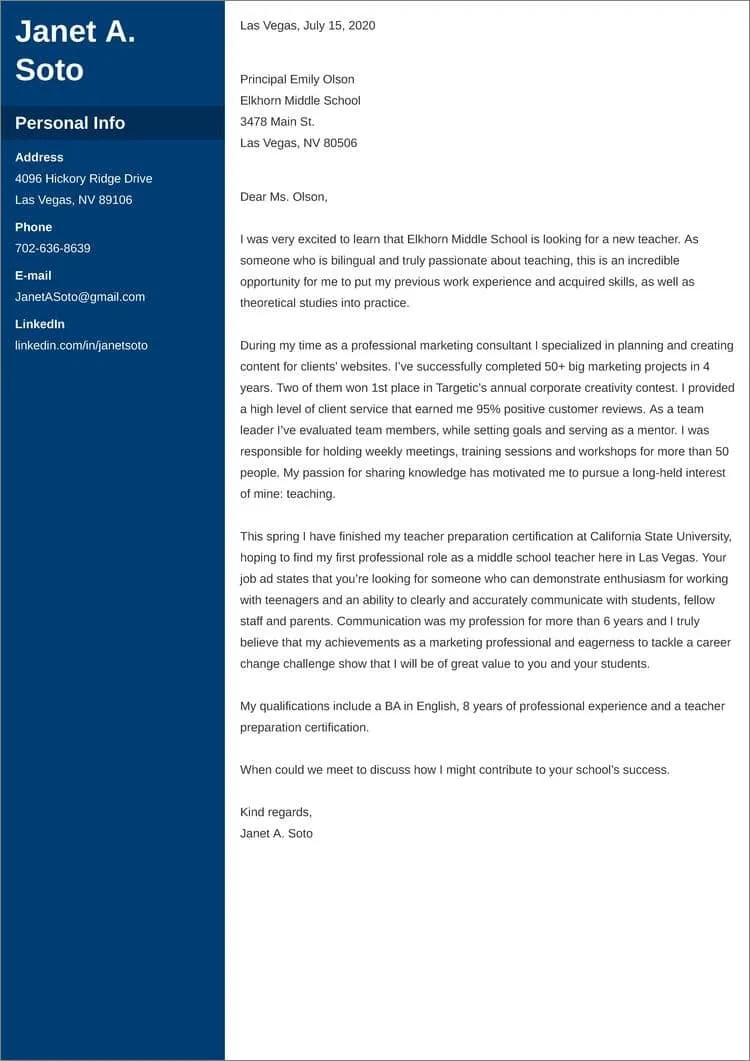Cover Letter for Industry Switch What to Know
Transitioning to a new industry is a significant career move, and your cover letter is your primary tool for making a compelling case. Unlike traditional cover letters that focus on experience within the same field, a cover letter for an industry switch must proactively address the career change, highlighting how your existing skills and experiences translate and are valuable in the new industry. It requires a strategic approach, focusing on transferable skills, demonstrating a deep understanding of the target industry, and clearly articulating your motivation for the change. The goal isn’t just to list your past accomplishments; it is to connect them to the needs and expectations of your desired industry, showing the hiring manager why you are a suitable candidate despite not having direct experience.
Highlighting Transferable Skills
One of the most critical aspects of a cover letter for switching industries is highlighting your transferable skills. These are skills you’ve developed in previous roles that are applicable and valuable in your target industry. Examples include project management, communication, problem-solving, leadership, and analytical skills. The first step is identifying your transferable skills, then linking them to the specific requirements of the new industry. For instance, if you’re transitioning from project management in manufacturing to project management in tech, emphasize your experience with deadlines, budgets, and team leadership as they apply to the software development lifecycle. Use specific examples from your past to demonstrate how you’ve successfully used these skills in various situations, quantifying your achievements whenever possible to show the impact of your skills.
Identifying Relevant Skills
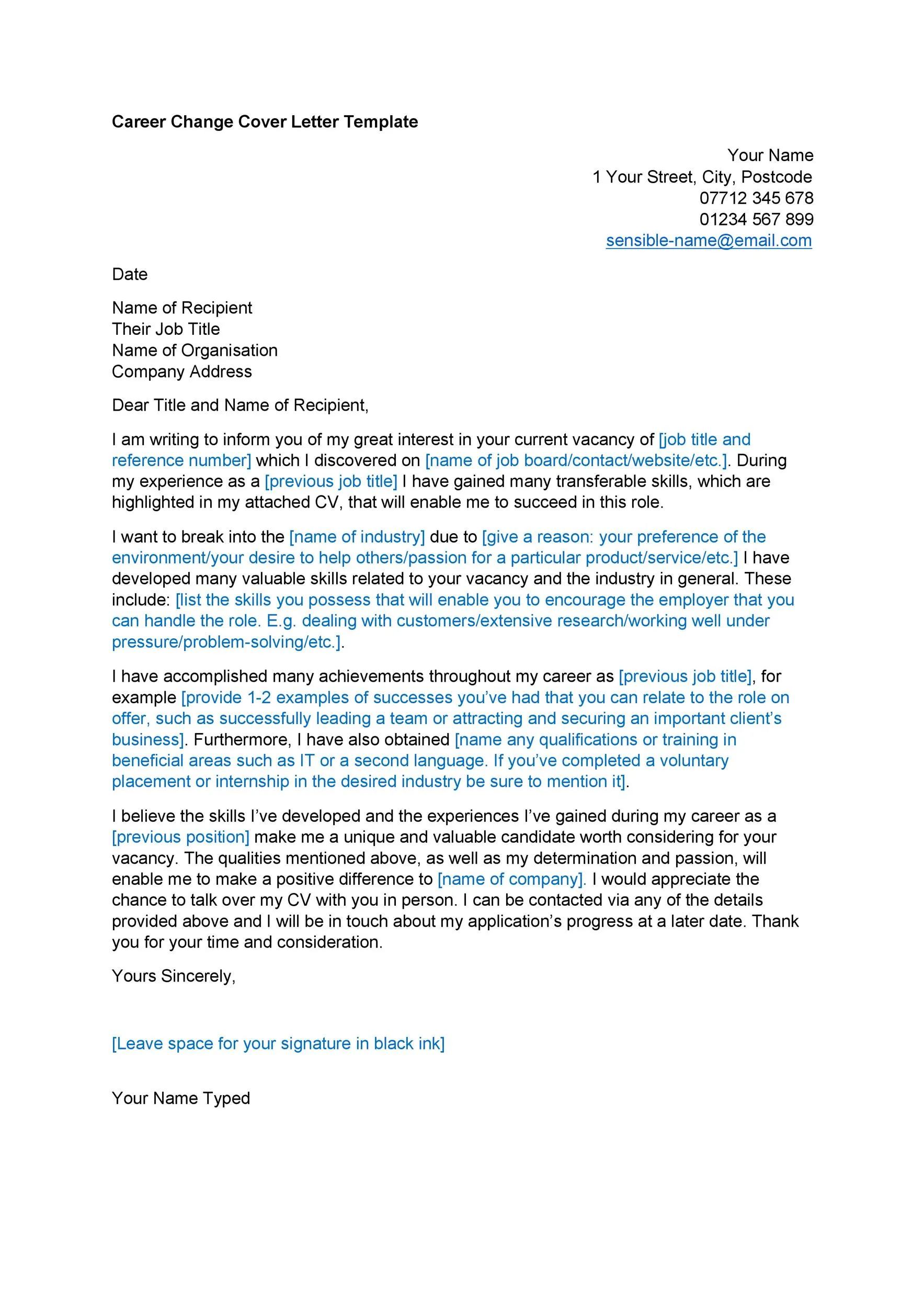
To effectively highlight transferable skills, start by carefully reviewing the job descriptions of the roles you’re interested in. Identify the key skills and competencies the employer is looking for. Make a list of your skills, both hard and soft, and then connect them to the requirements outlined in the job description. For example, if a job description in marketing requires content creation skills, and you have experience writing marketing materials, website content, or social media posts in your previous role, be sure to include this. Moreover, it’s crucial to back up your claims with concrete examples that demonstrate the application and impact of your skills in your previous roles, making your cover letter credible and persuasive. This approach will help you tailor your cover letter to each specific job application and increase your chances of getting noticed.
Showcasing Achievements
Highlighting your achievements is an essential part of a cover letter, especially when switching industries, as it provides concrete evidence of your abilities. Instead of just listing job responsibilities, focus on quantifiable results and accomplishments from your previous roles. For instance, if you managed a team that increased sales, specify the percentage increase and the time frame. If you led a project that reduced costs, state the amount of the cost savings. These specific, measurable achievements demonstrate your impact and value. When crafting your cover letter, use the STAR method (Situation, Task, Action, Result) to structure your examples. This method helps you clearly describe the situation, the task you were assigned, the actions you took, and the positive results you achieved. This approach provides a clear and concise narrative that highlights your competence and results in an easily understandable manner.
Researching the Target Industry
Before you begin writing your cover letter, it’s crucial to research your target industry thoroughly. Understanding the industry’s current trends, challenges, and key players will help you tailor your letter and demonstrate your genuine interest. Explore industry-specific publications, websites, and blogs to stay informed about the latest developments. This research will help you understand the industry’s language, requirements, and expectations. In your cover letter, mention specific companies or projects within the industry that interest you. This shows that you’ve done your homework and are serious about making the switch. Your cover letter should reflect your understanding of the industry’s specific needs and demonstrate how your skills can contribute to their success. This research is essential for making your cover letter stand out and showing that you are a well-informed candidate.
Understanding Industry Trends
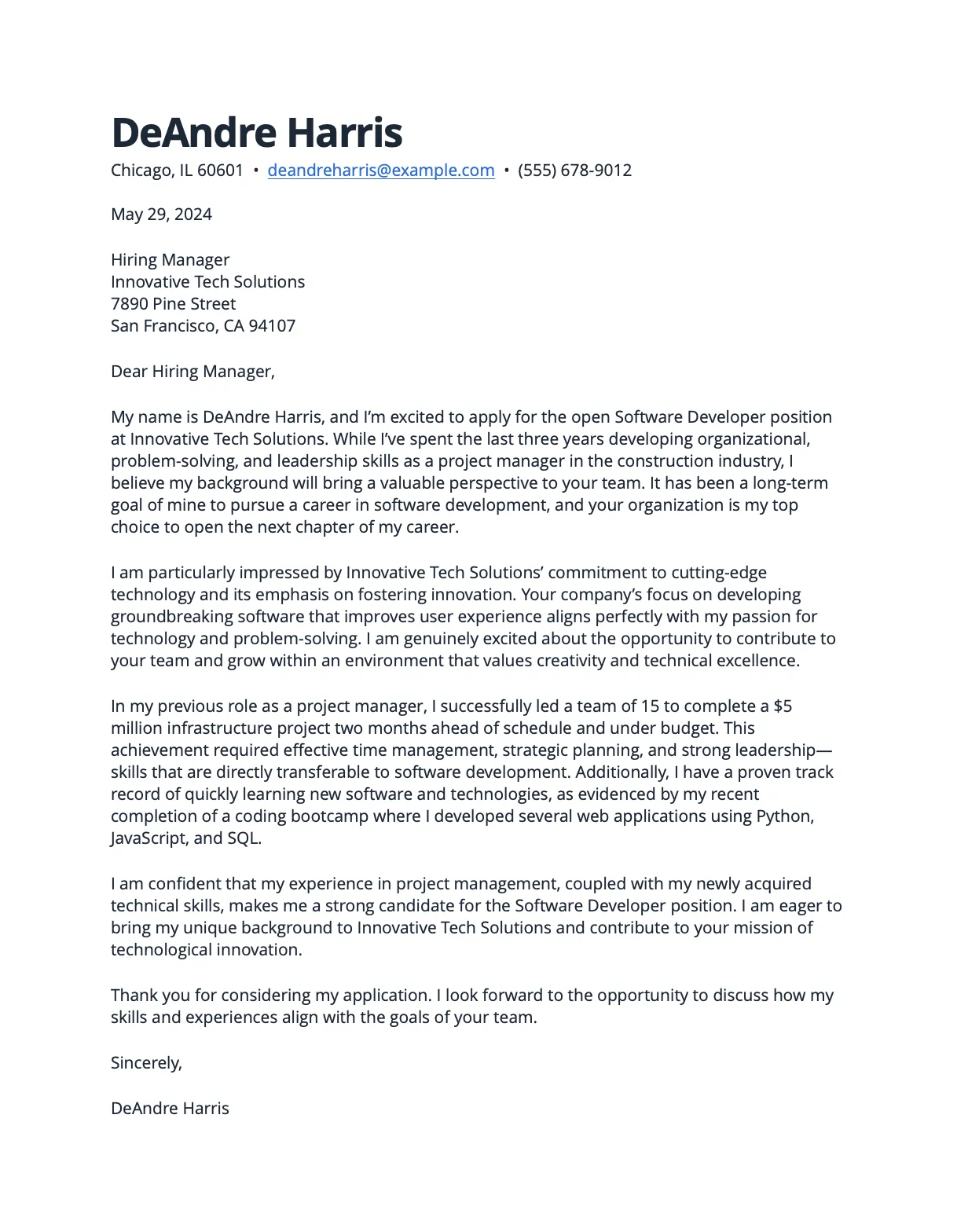
Staying informed about the current trends in your target industry is an essential part of your research. This knowledge will enable you to position yourself as a forward-thinking candidate who is ready to contribute to the industry’s future. Look at reports, analysis, and industry blogs to stay updated on technological advances, market shifts, and emerging needs. For example, if you are switching to the tech industry, it would be beneficial to know about the latest developments in AI, cloud computing, or cybersecurity. Likewise, for a transition into healthcare, familiarity with telemedicine, patient data privacy, and advancements in medical technology is essential. By understanding these trends, you can tailor your cover letter to show the hiring manager that you understand the industry’s direction and that you can align your skills and experiences to these needs.
Tailoring Your Cover Letter
One of the most critical aspects of crafting a successful cover letter is tailoring it to each specific job and company. A generic cover letter is unlikely to impress a hiring manager, especially when you are trying to switch industries. Start by carefully reviewing the job description and identifying the key requirements and keywords. Then, customize your cover letter to match these requirements. This includes adjusting the language, highlighting relevant skills and experiences, and aligning your career goals with the company’s mission. Address the hiring manager by name if possible, showing that you’ve invested time in researching the company. Your goal is to demonstrate a clear understanding of the company’s needs and to articulate how you can contribute to its success. This personalized approach increases your chances of capturing the hiring manager’s attention and securing an interview.
Formatting Your Cover Letter
The formatting of your cover letter is just as important as its content. A well-formatted cover letter is easy to read, professional, and presents you in a positive light. Use a clean, professional font such as Arial, Times New Roman, or Calibri, with a font size of 11 or 12 points. Keep your letter concise, ideally no more than one page, and use clear headings and bullet points to break up the text and highlight key information. Ensure consistent spacing and alignment throughout the document. Avoid using fancy fonts or excessive colors, which can distract from the content. Use bolding, italics, or underlining sparingly to emphasize key points or keywords. A well-formatted cover letter demonstrates attention to detail and professionalism, both crucial qualities for a job applicant.
Structuring Your Cover Letter
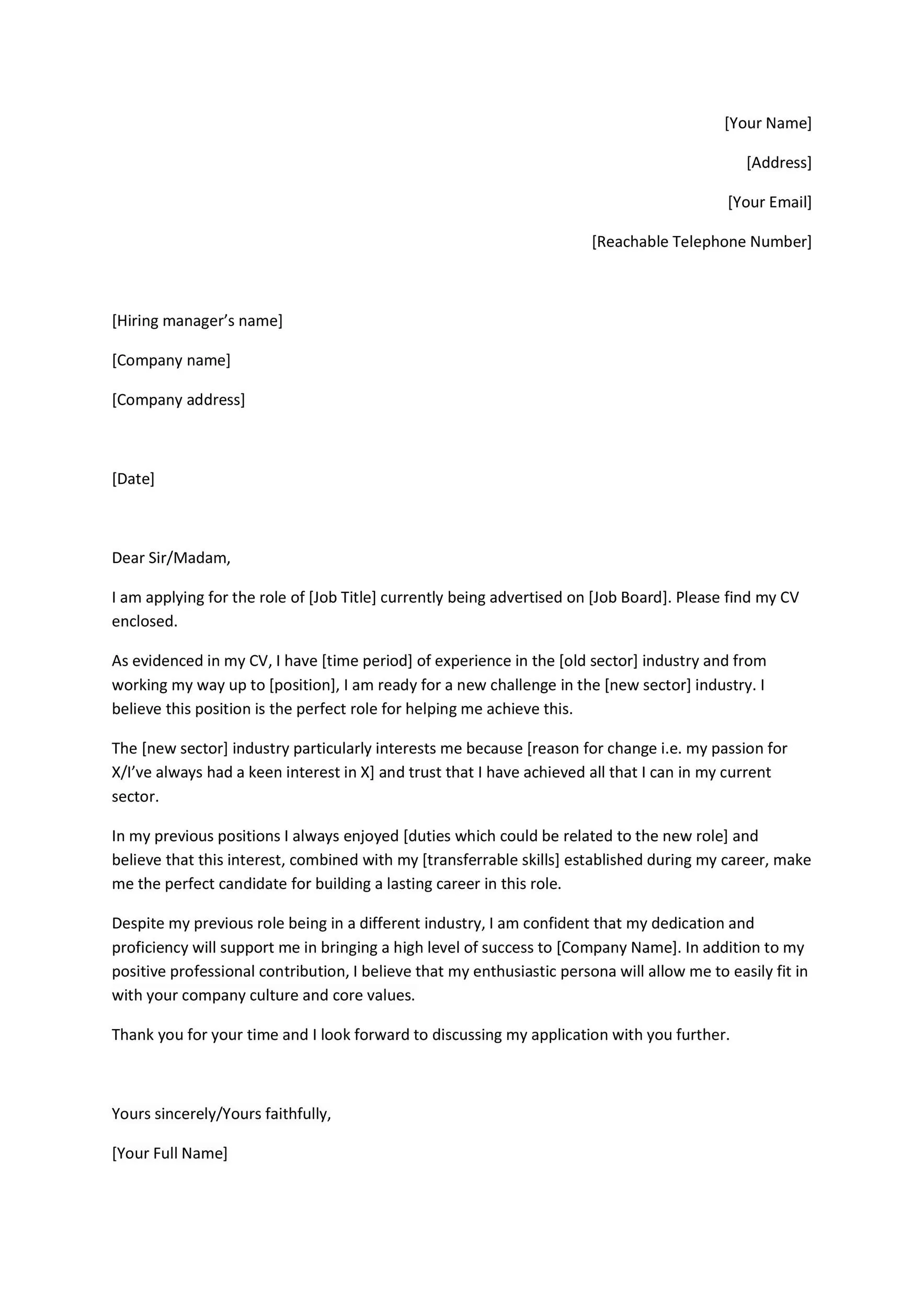
The structure of your cover letter is important for effectively communicating your message and showcasing your qualifications. The standard cover letter format includes an introduction, body paragraphs, and a conclusion. The introduction should immediately capture the reader’s attention and state the position you are applying for and where you saw the job posting. The body of the letter should highlight your relevant skills, experiences, and accomplishments, emphasizing how they align with the job requirements. Break up your cover letter into three or four paragraphs, each focusing on a key aspect of your qualifications or career change motivation. End with a strong conclusion restating your interest in the position and expressing your enthusiasm for the opportunity. Use a clear and concise writing style to present your qualifications in an organized and easily understandable manner, making it easier for the hiring manager to quickly assess your suitability for the role.
Opening Paragraph Essentials
Your opening paragraph is your first chance to make a positive impression, so it needs to be compelling and engaging. Start by clearly stating the position you are applying for and where you found the job posting. Then, grab the reader’s attention by briefly mentioning something that sparked your interest in the role or the company. Avoid generic opening lines like “I am writing to express my interest.” Instead, try a more personalized approach, such as mentioning a specific project the company is working on or a recent achievement. In the first paragraph, you should also succinctly address your industry switch, showing the hiring manager that you are aware of your career change. This proactive approach demonstrates that you have thought about your career transition and are prepared to articulate your reasons for the change.
Body Paragraph Strategies
The body paragraphs of your cover letter are where you showcase your transferable skills, highlight achievements, and address your career change. Each paragraph should focus on a specific point, making it easy for the reader to follow your narrative. Start each paragraph with a clear topic sentence that states the main idea, then provide supporting details, such as specific examples and quantifiable achievements. When addressing your career change, explain your reasons for switching industries honestly and clearly. Highlight your passion for the new industry and your commitment to learning and growing in your new role. Use the STAR method to showcase your accomplishments, focusing on the situation, task, action, and results. This structured approach provides concrete evidence of your capabilities and the value you can bring to the new industry.
Closing Paragraph Techniques
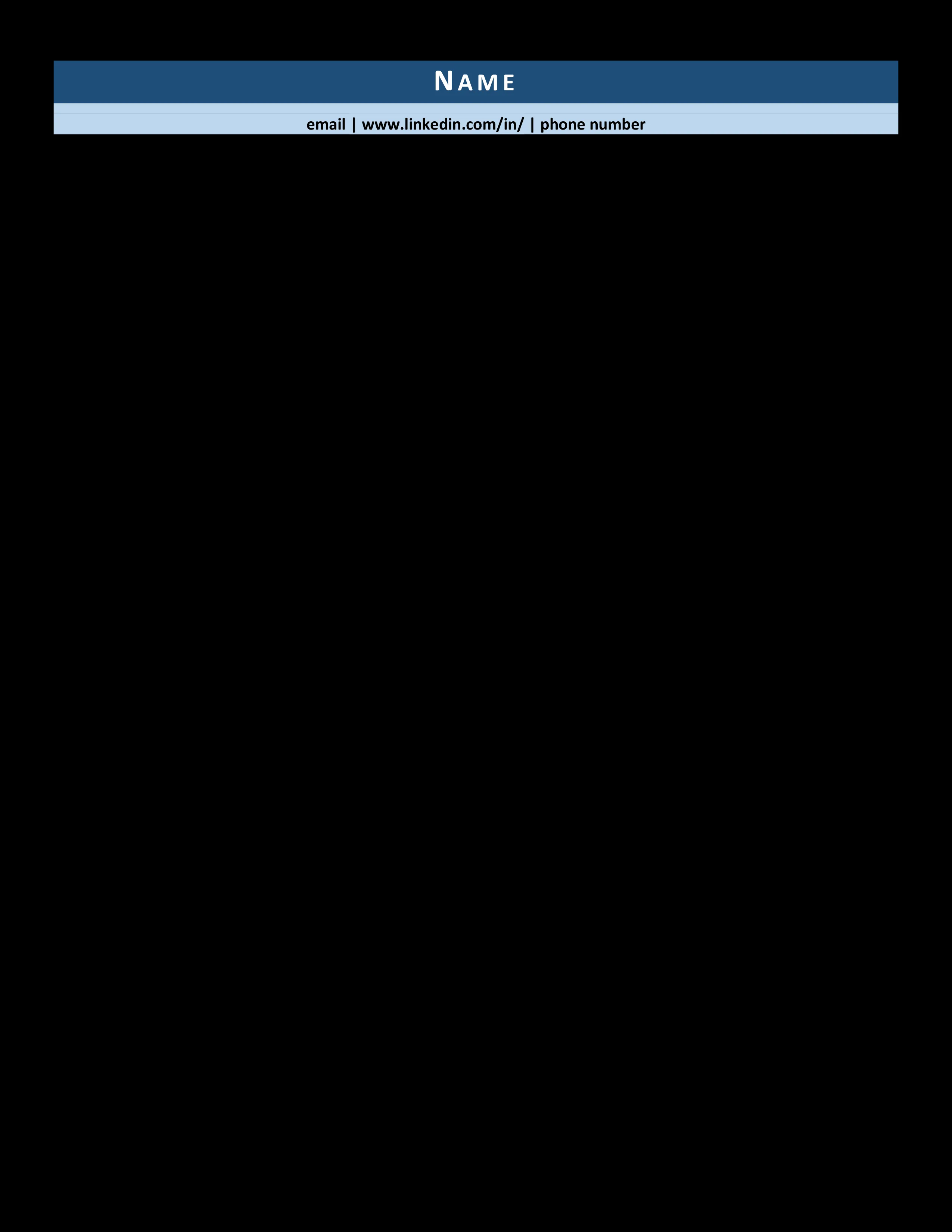
The closing paragraph of your cover letter should leave a lasting positive impression. It is the last opportunity to reiterate your interest in the position and express your enthusiasm for the opportunity. Restate your key qualifications and reiterate your understanding of the company’s needs. Avoid generic phrases like “Thank you for your time.” Instead, express your eagerness to discuss how your skills and experiences can benefit the company. Include a call to action, such as suggesting a meeting or interview. Make sure your closing is professional and confident, assuring the hiring manager that you are a strong candidate and eager to move forward. Ending your letter on a positive note, showcasing your excitement and desire to contribute, increases your chances of getting the desired response.
Addressing the Career Change
Addressing your career change directly and honestly is crucial in a cover letter for switching industries. Avoid trying to hide your career transition; instead, embrace it and explain your motivations clearly and concisely. Start by acknowledging your previous industry and then explain why you are making the switch. Highlight your genuine interest in the new industry, showing that you have a clear reason for the change. Be transparent about your transferable skills and how they apply to the new role, focusing on how your experience can benefit the company. Use positive language and emphasize your enthusiasm for learning and growing in the new environment. Addressing the career change head-on demonstrates your self-awareness, and willingness to adapt, which are valuable qualities.
Explaining Your Motivation
A key component of addressing your career change is clearly explaining your motivation for the switch. Hiring managers will want to know why you are moving from your previous industry to theirs. Your explanation should be genuine and reflect your sincere interest in the new industry. Perhaps you’re seeking a new challenge, a better work-life balance, or more opportunities for personal growth. Be sure to explain these reasons clearly and professionally. Tie your motivations back to the specific role and company. Show how your new goals align with the company’s mission and values. For example, if you are moving to the tech industry because you are passionate about innovative technology, mention specific projects or companies that have inspired you. Your ability to articulate your motivations convincingly can be a powerful tool for capturing the hiring manager’s attention and securing an interview.
Emphasizing Enthusiasm
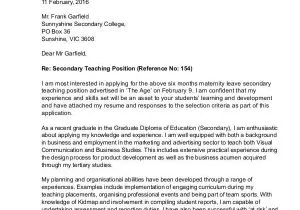
Enthusiasm is contagious, so make sure your cover letter reflects your excitement about the prospect of working in a new industry. Use positive and energetic language throughout your letter. Show that you are genuinely excited about the opportunity. Mentioning specific aspects of the role or company that interest you can highlight your enthusiasm. For example, if the company has a strong company culture, mention it. If you are impressed by its recent innovation, say so. Demonstrating your passion and eagerness to contribute will make you a more compelling candidate. Express your desire to learn, grow, and take on new challenges in the new industry. By highlighting your enthusiasm, you will stand out from other candidates and show hiring managers that you are eager to work in the new environment.
Action Verbs to Use
Using strong action verbs is crucial for writing an effective cover letter, especially when you are transitioning to a new industry. Action verbs make your accomplishments more dynamic and engaging. Start each bullet point or sentence that describes your responsibilities or achievements with a strong action verb. For example, instead of saying “Responsible for managing projects,” say “Managed projects,” or “Led project teams.” Here is a list of useful action verbs: led, managed, developed, implemented, created, designed, improved, increased, decreased, achieved, launched, coordinated, collaborated, and many more. By using strong action verbs, you demonstrate your ability to take initiative and achieve results, which is critical when switching industries.
Keywords to Incorporate
Incorporating relevant keywords is important to make your cover letter stand out and ensure that it gets noticed by both human readers and Applicant Tracking Systems (ATS). Keywords are terms and phrases that describe the skills, qualifications, and experiences that employers are seeking. Start by carefully reviewing the job description and identifying the key requirements. Then, integrate these keywords naturally throughout your cover letter. Make sure you use the same words and phrases that the employer uses. Use these keywords in your introduction, body paragraphs, and even in your closing. Remember to use these keywords naturally and avoid keyword stuffing, which can make your cover letter sound unnatural. A well-placed keyword can improve your chances of having your cover letter read by the hiring manager.
Proofreading and Editing
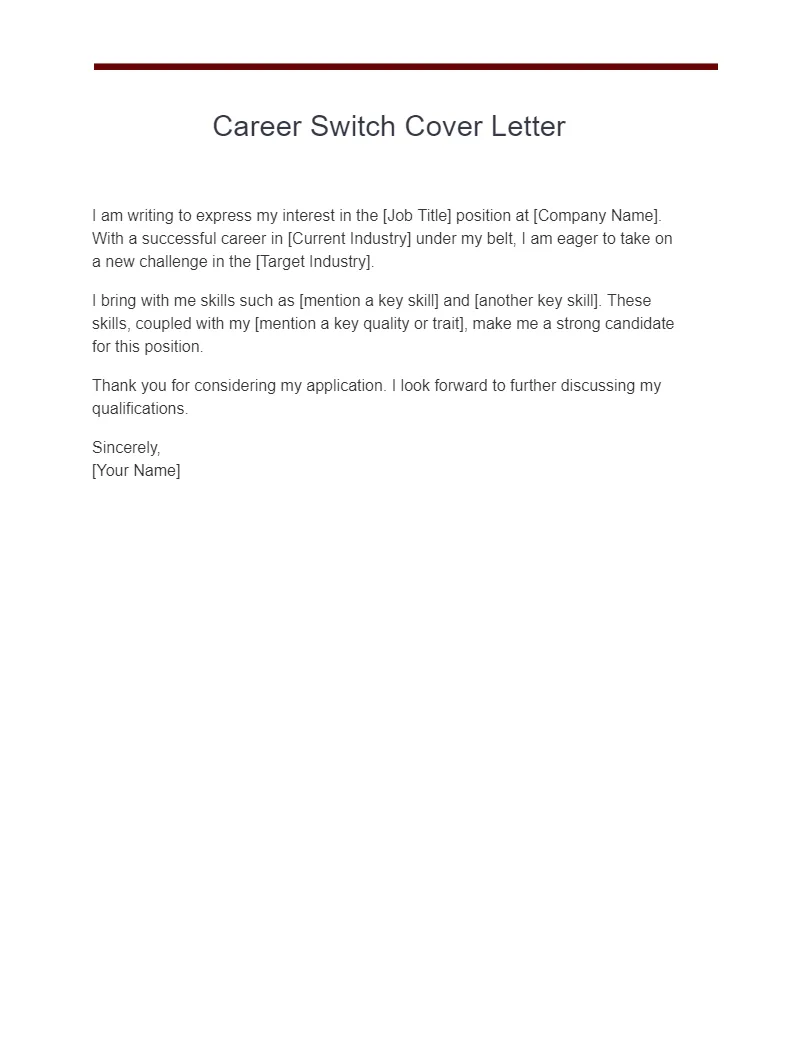
Proofreading and editing your cover letter is a critical step in the job application process, and it can significantly impact your chances of getting an interview. Errors in grammar, spelling, or punctuation can reflect a lack of attention to detail and a lack of professionalism. Before submitting your cover letter, carefully proofread it multiple times to catch any mistakes. Use spell-check and grammar-check tools, but don’t rely on them completely. Have a friend, family member, or career counselor review your cover letter for any errors or areas for improvement. Ensure your letter is clear, concise, and well-organized. This attention to detail demonstrates your professionalism and commitment to presenting yourself in the best possible light.
Common Mistakes to Avoid
When writing a cover letter for switching industries, certain mistakes can undermine your chances of success. Avoid generic, one-size-fits-all cover letters; tailor each letter to the specific job and company. Don’t focus solely on your past experience without explaining the relevance to the new industry. Never include negative language or bad-mouth your previous employer; instead, frame your career change in a positive and proactive manner. Avoid overselling your abilities or making claims you can’t back up. Don’t use clichés, jargon, or overly complex language. Always proofread for errors in grammar, spelling, and punctuation. Finally, don’t forget to include a call to action. By avoiding these common mistakes, you can create a cover letter that stands out and effectively communicates your qualifications.
Seeking Feedback
Seeking feedback is crucial for creating a compelling cover letter. Having other people review your cover letter can provide fresh perspectives and help you identify areas for improvement. Ask friends, family members, career counselors, or mentors to review your letter and provide constructive criticism. Ask them to assess the clarity, organization, and impact of your letter. Be open to their feedback and use it to refine your letter. If you have a career counselor, they can offer expert advice on how to highlight your skills, address your career change, and tailor your letter to specific jobs. Feedback from multiple sources can help you create a polished, persuasive cover letter that increases your chances of getting an interview.
Cover Letter Examples for Different Industries
Reviewing cover letter examples for different industries can provide valuable insights into how to effectively showcase your skills and address industry-specific requirements. Cover letter examples can serve as templates, helping you understand how to structure your letter, highlight your transferable skills, and articulate your motivation for changing industries. Be sure to find examples that are relevant to your target industry. Analyze how the examples address the career change, emphasizing transferable skills and explaining the applicant’s interest in the new field. You can also adapt elements from these examples to create your own unique cover letter, customizing them to fit your specific qualifications and goals.
Cover Letter Example Healthcare
If you are transitioning to the healthcare industry, your cover letter should highlight experiences such as customer service, communication, and problem-solving. Emphasize any relevant skills, such as data analysis or project management, if those are important for the position. Make sure you align your cover letter with the values of the healthcare industry, such as empathy, compassion, and dedication to patient care. Be sure to include your motivation for switching to the healthcare industry, and use language that resonates with the healthcare professionals. Furthermore, you can include specific examples of experiences where you demonstrate empathy, dedication to patient care, and problem-solving.
Cover Letter Example Technology
For a technology industry cover letter, showcase any technical skills and your willingness to learn new technologies. If you are switching from a non-technical background, emphasize project management, communication, and leadership skills. If you’re transitioning from project management in manufacturing to project management in tech, emphasize your experience with deadlines, budgets, and team leadership as they apply to the software development lifecycle. Highlight any relevant experience with software, data analysis, or coding, even if it was part of your hobby. Show an understanding of current industry trends. When possible, reference specific tech companies, projects, or technologies that excite you, and show the hiring manager your genuine enthusiasm.
Cover Letter Example Marketing
A marketing industry cover letter should showcase your creativity, communication skills, and understanding of marketing strategies. Highlight any experience with content creation, social media management, or data analysis. Emphasize your skills with the marketing industry’s trends and tools. If you are pivoting from a sales background, highlight your client relationships and persuasive communication skills. Tailor the letter to the specific marketing role. If you can show success metrics, your cover letter will stand out.
Cover Letter Example Finance
In a finance industry cover letter, highlight your analytical abilities, attention to detail, and any relevant experience with numbers, financial software, or data analysis. If you are moving from a non-finance background, show how the skills from your previous industry can be useful in finance. Tailor your cover letter to the specific financial role. If you have experience with project management, accounting, or business strategy, include it in your cover letter. If you have a finance degree, be sure to highlight it.
